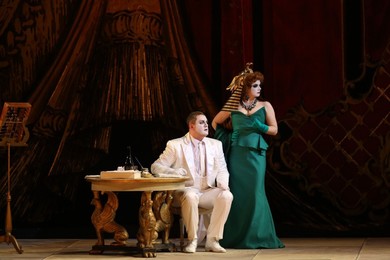Music by Wolfgang Amadeus Mozart
Libretto by Johann Gottlieb Stephanie
Der Schauspieldirektor (The Impresario), is a comic singspiel by Wolfgang Amadeus Mozart, set to a German libretto by Gottlieb Stephanie, an Austrian Schauspieldirektor. Originally, it was written because of "the imperial command" of the Holy Roman Emperor Joseph II who had invited 80 guests to a private luncheon. It is regarded as "a parody on the vanity of singers", who argue over status and pay.
Mozart, who describes it as "comedy with music" wrote it as his entry in a musical competition which was given a private performance hosted on 7 February 1786 by Joseph II at the Schönbrunn Palace in Vienna. This competition pitted a German singspiel, presented at one end of the room, against a competing Italian opera, the Italian entry being Antonio Salieri's opera buffa, Prima la musica e poi le parole (First the Music, then the Words), which was then given at the other end of the room. The premiere was followed by the first of three public performances given four days later at the Kärntnertor Theater, Vienna, on 11 February.
The work was written during a very creative period in Mozart's life, at the same time as his Le nozze di Figaro, which premiered later the same year, along with three piano concertos and "another dozen major works".
In addition to the overture, there are only four vocal numbers in the score, and the musical content (about 30 minutes) is surrounded by much spoken dialogue, typical in its day. One highlight, which Erik Smith describes as very funny, is where "each lady sings about the nobility of her art while trying to defeat her rival with ever higher notes". Although it has been described as a "silly farce", Mozart appears to have taken the opportunity to write serious arias and thus the "audition" of Madame Herz includes her aria "Da schlägt die Abschiedsstunde" ("There tolls the hour of departure"), while Mme Silberklang sings the elegant rondo, "Bester Jüngling" ("Dearest Youth").
 Mariinsky Theatre:
Mariinsky Theatre:  Mariinsky-2 (New Theatre):
Mariinsky-2 (New Theatre):  Mariinsky Concert Hall:
Mariinsky Concert Hall: 

